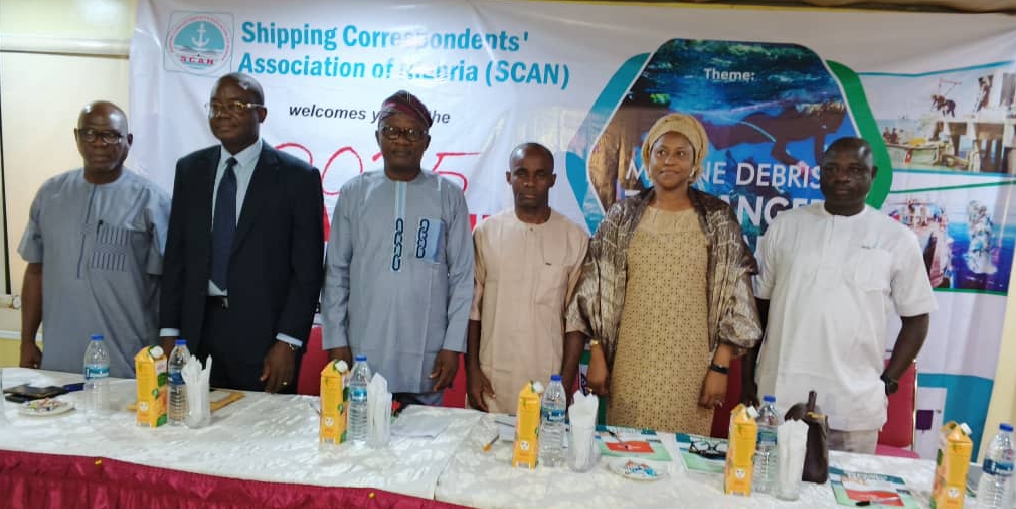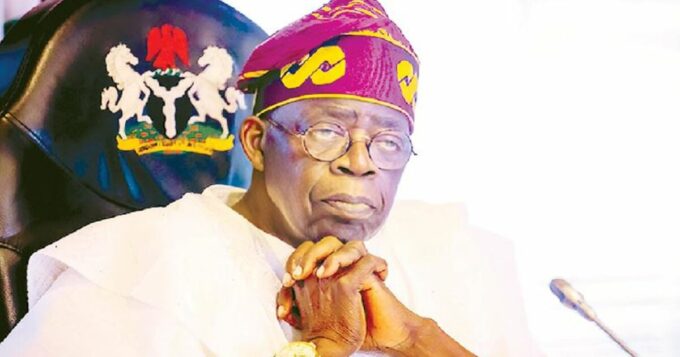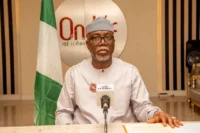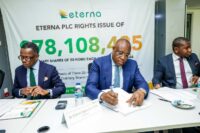By Steve Agbota
Stakeholders in Nigeria’s maritime industry have raised the alarm over the persistent presence of wrecks and derelicts littering key waterways, calling it a major threat to safety and navigability. They expressed concern over the absence of clear responsibility among regulatory agencies, even as overlapping environmental levies continue to burden shipowners.
The concerns were raised during the 2025 Annual Summit of the Shipping Correspondents Association of Nigeria (SCAN) held recently in Lagos, where participants criticised the continued power tussle among the Nigerian Maritime Administration and Safety Agency (NIMASA), the National Inland Waterways Authority (NIWA), and the Nigerian Ports Authority (NPA) regarding wreck removal duties.
“Whose responsibility is this? Is it NIWA? Is it NPA? Is it NIMASA? Ideally, I think it should be NIWA, but everybody just seems to be playing their part with no coordination,” queried Dr. Anthony Joshua, who represented shipowner Alhaji Aminu Umar, CEO of Sea Transport Services Nigeria Limited. “There has to be clear direction. When we need to report a wreck or raise safety concerns, we should know exactly who to approach.”
Despite NIMASA launching a multi-billion naira wreck removal programme in 2021, stakeholders argue the initiative has yielded little progress. The 2025 budget also saw NIWA allocating N850 million for wreck removal and debris clean-up across inland waterways, with N300 million targeted at the southern regions.
However, the overlapping mandates enshrined in the enabling laws of NIMASA, NIWA, and the NPA have led to confusion. Section 22(1)(n) of the NIMASA Act (2007), the NIWA Act (1997), and Section 7 of the NPA Act (1999) all give these agencies varying authority to remove wrecks from national waters.
“The absence of a coordinated approach among NIMASA, NPA, and NIWA has left vessel operators confused and exposed to avoidable risks,” Dr. Joshua said, citing damage to vessel propellers by abandoned fishing nets in the Warri–Escravos channel as one example.
Beyond wreck removal, stakeholders also criticised NIMASA’s imposition of multiple environmental levies under different guises, alleging a lack of transparency.
“Our concern in the industry is that for every vessel that comes to Nigeria, NIMASA charges an Environmental Protection Levy. For vessels going to offshore terminals, there is an additional Offshore Waste Reception Management Levy. Are they going offshore to receive waste?” he asked.
“You pay the Sea Protection Levy for every vessel, whether foreign or Nigerian-flagged. Nigerian vessels are charged annually. Foreign vessels pay per entry. And if you’re heading offshore, you pay all three – the Sea Protection Levy, the Environmental Levy, and Offshore Waste charges. It’s choking and it’s raising serious apprehension among stakeholders,” he said. “We are not opposing environmental regulation, but these levies must be transparent, accountable, and justified.”
Responding to the concerns, Mrs. Aisha Eri, Assistant General Manager at NIWA, who represented NIWA’s Managing Director, explained that a multi-agency Wreck Removal Committee currently exists to manage the issue collaboratively.
“NIWA, NIMASA, NPA are involved. It’s called the Wreck Removal Committee. So, if you have a wreck issue, you can come to any of us. We are all involved,” she said, adding that wrecks are handled based on jurisdiction.
Also clarifying roles, Capt. Femi Oyewole, Principal Marine Manager at NPA who represented the Managing Director, noted that the NPA works closely with Lagos Channel Management (LCM) to remove wrecks near navigational channels, while NIWA is responsible for those within inland waterways.
“On wreck removal, I just want to add that it depends on where the wreck is… If the wreck is in the hinterland, NIWA takes care of that,” he said.
Stakeholders urged the Federal Ministry of Marine and Blue Economy to initiate a national dialogue involving all regulatory bodies and port authorities to streamline responsibilities, ensure effective compliance, and eliminate undue financial burdens on vessel operators.


















Leave a comment